What Purpose Do Mosquitoes Serve?
Posted by Mosquito Squad
February 3, 2022

The Purpose of Mosquitoes
While mosquitoes are annoying and irritating pests, they do fulfill a vital purpose. All mosquito species are tasty treats for animals like fish, birds, lizards, frogs, and bats. While no animals solely depend on any variety of mosquitoes for the majority of their food, they do help lend balance to our ecosystem.
Mosquitoes have lived on Earth for more than 100 million years, making them experts at evolution. There are about 3,500 different kinds of mosquitoes and only the females of 6 percent of those species need blood meals from humans to create eggs and reproduce. Only two species are responsible for a vast majority of mosquito-borne diseases. The Anopheles gambiae carries malaria, for example. The Aedes aegypti came to the U.S. aboard slave ships, spreading yellow fever and, as seen more recently, Zika.
The Good
While all mosquito species make tasty treats for plenty of animals like fish, birds, lizards, frogs, and bats, no animals solely depend on any variety of mosquitoes for the majority of their food. So that means we could get rid of all the mosquitoes and nothing bad would happen, right?
It’s not that easy. No one can know exactly what would happen if we got rid of mosquitoes everywhere. It theoretically would open up room for other insects, and researchers hypothesize those might pose a public health threat as well. We can also think of mosquitoes as great defenders of Earth’s rainforests. Mosquitoes make rainforests nearly uninhabitable by humans, greatly reducing man-made development in these areas. Science writer David Quammen has said, "Nothing has done more to delay this catastrophe over the past 10,000 years than the mosquito."
There are also some “good” mosquitoes who might be getting a bad rap due to their family reputation. There are more than 90 species that fall under the genus Toxorhynchites, also known as the “elephant mosquito” because of their size. The larvae of these good guys eat other mosquito larvae.[1]
The Bad
Mosquitoes aren’t single-handedly responsible for the survival of any other species, nor are they the only pollinators of any specific plant or region. Janet McAllister of the Centers for Disease Control and Prevention in Fort Collins, Colorado said in the journal Nature, “If there was a benefit to having them around, we would have found a way to exploit them.”[2]
So while researchers agree that getting rid of mosquitoes is a moral and environmental gray area at best, there’s no strong argument for a purpose they serve, other than being a part of our ecosystem. It certainly isn’t a stretch to say they cause more harm than good: nearly half the world’s population is at risk for some mosquito-borne disease, and the financial cost is real as well. Countries freed of their high malaria burden, for example in sub-Saharan Africa, might recover the 1.3% of growth in gross domestic product that the World Health Organization estimates they lose to the disease each year, potentially accelerating their development.[3]
The Future
Researchers are focusing on the public health threat from mosquitoes and on a few different techniques that right now are working in the lab, but they’re still too early to deploy in the fight against mosquito-borne diseases.
While this might seem like new tech, in the 1940s, Edward Knipling, a researcher at the U.S. Department of Agriculture, started sterilizing screwworm flies by exposing them to radiation from an X-ray machine. Due to his work, by 1959, the fly was completely eradicated from all Southeastern states and then disappeared from the United States all together.
This technique does not work on mosquitoes, but researchers are developing similar “sterilization” experiments. One even includes engineered mosquitoes that carry a set of genes that shred the X chromosomes in sperm. They can reproduce, but all their offspring will be male. Eventually, the population in an area runs out of females and dies off altogether. While small initiatives progress, there will never be a silver bullet. Frances Hawkes from the Natural Resources Institute at the University of Greenwich told BBC, "We are playing an evolutionary game with mosquitoes. Hopefully it's one we can get on top of over the next 10 to 15 years."[4]
So while the harm from mosquitoes far outweighs any benefit they provide, these creatures are part of a delicate Earth. Since it’s the only one Earth we have, we can treasure and protect it while protecting ourselves from some of the dangers our co-habitants pose.
[1] What Would Happen If We Eliminated the World’s Mosquitoes? September 13, 2017. Forbes. https://www.forbes.com/sites/quora/2017/09/13/what-would-happen-if-we-eliminated-the-worlds-mosquitoes/#24f3056811f6
[2] Fang, Janet. A World Without Mosquitoes. July 2010. Nature. https://www.nature.com/news/2010/100721/pdf/466432a.pdf
[3] Fang, Janet. A World Without Mosquitoes. July 2010. Nature. https://www.nature.com/news/2010/100721/pdf/466432a.pdf
[4] Bates, Claire. Would it be wrong to eradicate mosquitoes? BBC Magazine. January 28, 2016. https://www.bbc.com/news/magazine-35408835
